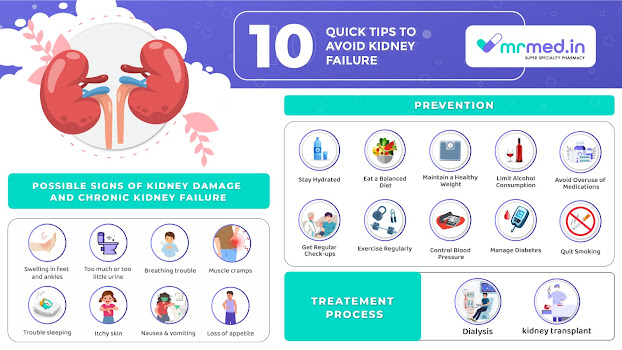10 Tips To Avoid Kidney Failure
To help prevent kidney failure, it's important to maintain a healthy lifestyle and take certain precautions. Here are some tips to avoid kidney failure:
Stay Hydrated: Drinking an adequate amount of water helps to flush toxins out of your body and maintains kidney function. Aim to drink at least 8 glasses of water per day, unless your doctor recommends otherwise.
Eat a Balanced Diet: A healthy diet is crucial for maintaining kidney health. Include a variety of fruits, vegetables, whole grains, and lean proteins in your meals. Limit your intake of salt, processed foods, and sugary beverages.
Manage Blood Pressure: High blood pressure is a leading cause of kidney failure. Monitor your blood pressure regularly and take steps to keep it within a healthy range. This includes eating a low-sodium diet, exercising regularly, managing stress, and, if necessary, taking prescribed medications.
Control Blood Sugar: Diabetes is a major risk factor for kidney disease. If you have diabetes, it's important to control your blood sugar levels through diet, exercise, and medications as prescribed by your healthcare provider. Regularly monitor your blood sugar levels and follow your healthcare provider's recommendations.
Limit Alcohol Consumption: Excessive alcohol consumption can cause kidney damage. Limit your alcohol intake and avoid binge drinking.
Quit Smoking: Smoking increases the risk of kidney disease. If you smoke, make a concerted effort to quit. Seek support from healthcare professionals or support groups if needed.
Exercise Regularly: Engage in regular physical activity to maintain a healthy weight and improve overall cardiovascular health. Aim for at least 30 minutes of moderate-intensity exercise most days of the week, or as recommended by your doctor.
Avoid Overuse of Medications: Certain medications, such as nonsteroidal anti-inflammatory drugs (NSAIDs), can cause kidney damage if used excessively or over a prolonged period. Always follow the recommended dosage instructions and consult your doctor or pharmacist if you have concerns.
Stay Regularly Active: Maintain regular check-ups with your healthcare provider to monitor your kidney function, blood pressure, and overall health. Early detection and treatment of any potential issues can help prevent kidney failure.
Avoid Exposure to Toxins: Be cautious when working with or around toxic substances, chemicals, or heavy metals. Follow safety guidelines and use protective equipment to minimize exposure.
Remember, these tips can help reduce the risk of kidney failure, but they may not guarantee complete prevention. If you have any concerns or risk factors, consult with a healthcare professional for personalized advice and guidance.



Comments
Post a Comment